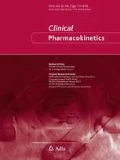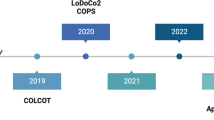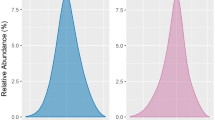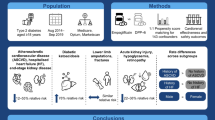Abstract
Thienopyridines are inactive prodrugs that are converted in vivo to active metabolites, which irreversibly bind to and inactivate platelet P2Y12 receptors, and inhibit platelet activation and aggregation. Prasugrel is a third-generation thienopyridine, recently approved for prevention of thrombotic cardiovascular complications in patients with an acute coronary syndrome undergoing percutaneous coronary intervention. Prasugrel is converted to its active metabolite (Pras-AM; compound R-138727) in two sequential steps: (i) rapid and complete hydrolysis by intestinal human carboxylesterase-2 to form a thiolactone intermediate; and (ii) oxidation of the thiolactone by cytochrome P450 (CYP) enzymes in the gut and/or the liver. CYP3A and CYP2B6 are the primary CYPs contributing to Pras-AM formation, with smaller contributions from CYP2C9 and CYP2C19. Prasugrel is rapidly absorbed and metabolized, with Pras-AM plasma concentrations peaking at about 0.5 hours after oral administration; this helps to account for the rapid onset of inhibition of platelet aggregation (IPA) achieved by prasugrel.
In the clinical pharmacology programme for prasugrel, bodyweight had the greatest effect of all covariates that were tested. In the phase III TRITON-TIMI 38 trial, the mean exposure to Pras-AM was 42% greater in patients weighing <60kg than in patients with the study population median bodyweight of 85 kg. In a pharmacodynamic meta-analysis of data from healthy subjects a decrease of 1 kg in bodyweight was associated with an increase in IPA of approximately 0.26 percentage points (p< 0.0001). Pras-AM exposure was greater in subjects aged ≥75 years, but exposure differences were not as large as those for bodyweight. Pras-AM exposure was greater in Asians than in Caucasians, but this appeared to result from a disproportionately greater exposure difference in Asian subjects with low bodyweight. Sex and allelic variation in CYPs 1A2, 2B6, 2C19, 2C9, 3A4 and 3A5 appeared to have no clinically relevant effect on Pras-AM exposure or IPA. Consistent with the lack of association between genetic status and these pharmacokinetic and pharmacodynamic results in healthy subjects, no significant association was detected between these allelic variants and the composite primary endpoint (cardiovascular death, non-fatal myocardial infarction or non-fatal stroke) in the TRITON-TIMI 38 trial. Studies in renally impaired subjects and subjects with mild or moderate hepatic impairment have indicated that dose adjustment is not required in these patient populations.
Prasugrel has few clinically significant drug-drug interactions. Potent CYP3A inhibitors, gastric acid suppressants and food have been shown to reduce the rate of formation of Pras-AM but not its overall exposure. This pharmacokinetic effect reduced the rate of onset of IPA after a loading dose but did not affect the peak IPA after a loading dose or the IPA during maintenance dosing. Potent induction of CYP3A, as well as smoking - which induces CYP1A2 — did not affect Pras-AM exposure or IPA. Prior treatment with clopidogrel did not influence tolerability to prasugrel and did not appear to alter IPA during prasugrel treatment. Prasugrel did not affect the activities of CYP2C9, CYP2C19 or P-glycoprotein, but it weakly inhibited CYP2B6. The inhibition of CYP2B6 is potentially clinically significant only for drugs that have a narrow therapeutic window and have CYP2B6 as the primary elimination pathway. No interaction was detected between prasugrel and heparin. Although prasugrel did not alter warfarin pharmacokinetics, prasugrel and warfarin should not be used together, because of an increased bleeding risk associated with their concomitant use.










Similar content being viewed by others
Notes
From the Plavix® summary basis of approval (page 12 of the Clinical Pharmacology and Biopharmaceutics Review),[87] the FDA concluded that “coadministration of 400mg cimetidine bid [twice daily] for 14 days with 75 mg clopidogrel did not affect the pharmacokinetics of SR26334 [the major metabolite of clopidogrel]. The changes in ADP induced maximum % platelet aggregation were not considered clinically significant since they were less than 10%.”
References
Talbert RL. Overview of advances in cardiovascular disease treatment and prevention: the evolving role of antiplatelet therapy. Am J Health Syst Pharm 2008 Jul 1; 65 (13 Suppl. 5): S1–5
King III SB, Smith Jr SC, Hirshfeld Jr JW, et al. 2007 focused update of the ACC/AHA/SCAI 2005 guideline update for percutaneous coronary intervention: a report of the American College of Cardiology/American Heart Association Task Force on Practice Guidelines: 2007 Writing Group to Review New Evidence and Update the ACC/AHA/SCAI 2005 Guideline Update for Percutaneous Coronary Intervention, writing on behalf of the 2005 Writing Committee [published erratum appears in Circulation 2008 Feb 12; 117 (6): e161]. Circulation 2008 Jan 15; 117(2): 261–95
Angiolillo DJ, Fernandez-Ortiz A, Bernardo E, et al. Variability in individual responsiveness to clopidogrel: clinical implications, management, and future perspectives. J Am Coll Cardiol 2007 Apr 10; 49(14): 1505–16
Antithrombotic Trialists’ Collaboration. Collaborative meta-analysis of randomised trials of antiplatelet therapy for prevention of death, myocardial infarction, and stroke in high risk patients [published erratum appears in BMJ 2002 Jan 19; 324 (7330): 141]. BMJ 2002 Jan 12; 324(7329): 71–6
Ferreiro JL, Angiolillo DJ. Clopidogrel response variability: current status and future directions. Thromb Haemost 2009 Jul; 102(1): 7–14
Emmons KL, Taylor NR. Contemporary issues in clopidogrel therapy: new evidence shaping clinical practice. Pharmacotherapy 2007 Apr; 27(4): 553–63
Smyth SS, Woulfe DS, Weitz JI, et al. G-protein-coupled receptors as signaling targets for antiplatelet therapy. Aterioscler Thromb Vasc Biol 2009 Apr; 29(4): 449–57
Jakubowski JA, Winters KJ, Naganuma H, et al. Prasugrel: a novel thienopyridine antiplatelet agent. A review of preclinical and clinical studies and the mechanistic basis for its distinct antiplatelet profile. Cardiovasc Drug Rev 2007 Winter; 25(4): 357–74
Schomig A, Neumann FJ, Kastrati A, et al. A randomized comparison of antiplatelet and anticoagulant therapy after the placement of coronaryartery stents. N Engl J Med 1996 Apr 25; 334(17): 1084–9
Eshaghian S, Kaul S, Amin S, et al. Role of clopidogrel in managing atherothrombotic cardiovascular disease. Ann Intern Med 2007 Mar 20; 146(6): 434–41
CAPRIE Steering Committee. A randomised, blinded, trial of clopidogrel versus aspirin in patients at risk of ischaemic events (CAPRIE). Lancet 1996 Nov 16; 348(9038): 1329–39
Yusuf S, Zhao F, Mehta SR, et al. Effects of clopidogrel in addition to aspirin in patients with acute coronary syndromes without ST-segment elevation [published errata appear in N Engl J Med 2001 Dec 6; 345 (23): 1716 and N Engl J Med 2001 Nov 15; 345 (20): 1506]. N Engl J Med 2001 Aug 16; 345(7): 494–502
Steinhubl SR, Berger PB, Mann III JT, et al. Early and sustained dual oral antiplatelet therapy following percutaneous coronary intervention: a randomized controlled trial [published erratum appears in JAMA 2003 Feb 26; 289 (8): 987]. JAMA 2002 Nov 20; 288(19): 2411–20
Sabatine MS, Cannon CP, Gibson CM, et al. Effect of clopidogrel pretreatment before percutaneous coronary intervention in patients with ST-elevation myocardial infarction treated with fibrinolytics: the PCI-CLARITY study. JAMA 2005 Sep 14; 294(10): 1224–32
Chen ZM, Jiang LX, Chen YP, et al. Addition of clopidogrel to aspirin in 45,852 patients with acute myocardial infarction: randomised placebocontrolled trial. Lancet 2005 Nov 5; 366(9497): 1607–21
Gurbel PA, Bliden KP, Butler K, et al. Response to ticagrelor in clopidogrel nonresponders and responders and effect of switching therapies: the RESPOND study. Circulation 2010 Mar 16; 121(10): 1188–99
Matetzky S, Shenkman B, Guetta V, et al. Clopidogrel resistance is associated with increased risk of recurrent atherothrombotic events in patients with acute myocardial infarction. Circulation 2004 Jun 29; 109(25): 3171–5
Cuisset T, Frere C, Quilici J, et al. High post-treatment platelet reactivity identified low-responders to dual antiplatelet therapy at increased risk of recurrent cardiovascular events after stenting for acute coronary syndrome. J Thromb Haemost 2006 Mar; 4(3): 542–9
Gurbel PA, Tantry US. Drug insight: clopidogrel nonresponsiveness. Nat Clin Pract Cardiovasc Med 2006 Jul; 3(7): 387–95
Hochholzer W, Trenk D, Bestehorn HP, et al. Impact of the degree of peri-interventional platelet inhibition after loading with clopidogrel on early clinical outcome of elective coronary stent placement. J Am Coll Cardiol 2006 Nov 7; 48(9): 1742–50
Sweeny JM, Gorog DA, Fuster V. Antiplatelet drug ‘resistance’: part 1. Mechanisms and clinical measurements. Nat Rev Cardiol 2009 Apr; 6(4): 273–82
Wiviott SD, Braunwald E, McCabe CH, et al. Prasugrel versus clopidogrel in patients with acute coronary syndromes. N Engl J Med 2007 Nov 15; 357(20): 2001–15
Lloyd-Jones D, Adams R, Carnethon M, et al. Heart disease and stroke statistics: 2009 update. A report from the American Heart Association Statistics Committee and Stroke Statistics Subcommittee. Circulation 2009 Jan 27; 119(3): 480–6
Wiviott SD, Braunwald E, McCabe CH, et al. Intensive oral antiplatelet therapy for reduction of ischaemic events including stent thrombosis in patients with acute coronary syndromes treated with percutaneous coronary intervention and stenting in the TRITON-TIMI 38 trial: a subanalysis of a randomised trial. Lancet 2008 Apr 19; 371(9621): 1353–63
Salazar DE, Ernest II CS, Wrishko RE, et al. Relationship between exposure to the prasugrel active metabolite with TIMI major/minor bleeding in TRITON-TIMI 38 [abstract no. 4001]. Circulation 2008; 118 (18 Suppl. 2): S815
Antman EM, Wiviott SD, Murphy SA, et al. Early and late benefits of prasugrel in patients with acute coronary syndromes undergoing percutaneous coronary intervention: a TRITON-TIMI 38(Trial to Assess Improvement in Therapeutic Outcomes by Optimizing Platelet Inhibition with Prasugrel-Thrombolysis In Myocardial Infarction) analysis. J Am Coll Cardiol 2008 May 27; 51(21): 2028–33
Bhatt DL. Intensifying platelet inhibition: navigating between Scylla and Charybdis. N Engl J Med 2007 Nov 15; 357(20): 2078–81
Harrison P, Frelinger III AL, Furman MI, et al. Measuring antiplatelet drug effects in the laboratory. Thromb Res 2007; 120(3): 323–36
Michelson AD, Frelinger III AL, Furman MI. Current options in platelet function testing. Am J Cardiol 2006 Nov 20; 98 (10 Suppl. 1): S4–10
Horstrup K, Jablonka B, Honig-Liedl P, et al. Phosphorylation of focal adhesion vasodilator-stimulated phosphoprotein at Ser157 in intact human platelets correlates with fibrinogen receptor inhibition. Eur J Biochem 1994 Oct 1; 225(1): 21–7
Jakubowski JA, Payne CD, Li YG, et al. A comparison of the antiplatelet effects of prasugrel and high-dose clopidogrel as assessed by VASP-phosphorylation and light transmission aggregometry. Thromb Haemost 2008 Jan; 99(1): 215–22
Jakubowski JA, Payne CD, Li YG, et al. The use of the VerifyNow P2Y12 point of care device to monitor platelet function across a range of P2Y12 inhibition levels following prasugrel and clopidogrel administration. Thromb Haemost 2008 Feb; 99(2): 409–15
Payne CD, Li YG, Small DS, et al. Increased active metabolite formation explains the greater platelet inhibition with prasugrel compared to high-dose clopidogrel. J Cardiovasc Pharmacol 2007 Nov; 50(5): 555–62
Farid NA, Kurihara A, Wrighton SA. The metabolism and disposition of the thienopyridine antiplatelet drugs ticlopidine, clopidogrel, and prasugrel in humans. J Clin Pharmacol 2010 Feb; 50(2): 126–42
Jakubowski JA, Payne CD, Weerakkody GJ, et al. Dose-dependent inhibition of human platelet aggregation by prasugrel and its interaction with aspirin in healthy subjects. J Cardiovasc Pharmacol 2007 Mar; 49(3): 167–73
Payne CD, Li YG, Brandt JT, et al. Switching directly to prasugrel from clopidogrel results in greater inhibition of platelet aggregation in aspirintreated subjects. Platelets 2008 Jun; 19(4): 275–8179
Small DS, Farid NA, Li YG, et al. Effect of ranitidine on the pharmacokinetics and pharmacodynamics ofprasugrel and clopidogrel. Curr Med Res Opin 2008 Aug; 24(8): 2251–7
Small DS, Farid NA, Payne CD, et al. Effects of the proton pump inhibitor lansoprazole on the pharmacokinetics and pharmacodynamics of prasugrel and clopidogrel. J Clin Pharmacol 2008 Apr; 48(4): 475–84
Farid NA, Payne CD, Small DS, et al. Cytochrome P450 3A inhibition by ketoconazole affects prasugrel and clopidogrel pharmacokinetics and pharmacodynamics differently. Clin Pharmacol Ther 2007 May; 81(5): 735–41
Farid NA, Payne CD, Ernest CS, et al. Prasugrel, a new thienopyridine antiplatelet drug, weakly inhibits cytochrome P450 2B6 in humans. J Clin Pharmacol 2008 Jan; 48(1): 53–9
Farid NA, Jakubowski JA, Payne CD, et al. Effect of rifampin on the pharmacokinetics and pharmacodynamics of prasugrel in healthy male subjects. Curr Med Res Opin 2009 Aug; 25(8): 1821–9
Farid N, Small D, Payne C, et al. Effects of atorvastatin on the pharmacokinetics and pharmacodynamics of prasugrel and clopidogrel in healthy subjects. Pharmacother 2008; 28(12): 1483–94
Eli Lilly and Company. Clinical study summary: study H7T-EW-TAAT. The effect of prasugrel on the pharmacodynamic response of unfractionated heparin in healthy subjects [CT registry ID# 8977; online]. Available from URL: http://www.clinicalstudyresults.org/documents/company-study_8937_0.pdf [Accessed 2010 Sep 8]
Eli Lilly and Company. Clinical study summary: study H7T-EW-TAAR. The effectofprasugrelonthe pharmacodynamics and pharmacokinetics ofsingle dose warfarin in healthy subjects [CT registry ID# 8975; online]. Available from URL: http://www.clinicalstudyresults.org/documents/company-study_8935_0.pdf [Accessed 2010 Sep 8]
Eli Lilly and Company. Clinical study summary: study H7T-EW-TAAX. The effect of prasugrel on the disposition of digoxin in healthy subjects [CT registry ID# 8982; online]. Available from URL: http://www.clinicalstudyresults.org/documents/company-study_8942_0.pdf [Accessed 2010 Sep 8]
Williams ET, Jones KO, Ponsler GD, et al. The biotransformation of prasugrel, a new thienopyridine prodrug, by the human carboxylesterases 1 and 2. Drug Metab Dispos 2008 Jul; 36(7): 1227–32
Rehmel JL, Eckstein JA, Farid NA, et al. Interactions of two major metabolites of prasugrel, a thienopyridine antiplatelet agent, with the cytochromes P450. Drug Metab Dispos 2006 Apr; 34(4): 600–7
Hagihara K, Kurihara A, Kawai K, et al. Absorption, distribution and excretion of the new thienopyridine agent prasugrel in rats. Xenobiotica 2007 Jul; 37(7): 788–801
Smith RL, Gillespie TA, Rash TJ, et al. Disposition and metabolic fate of prasugrel in mice, rats, and dogs. Xenobiotica 2007 Aug; 37(8): 884–901
Farid NA, Smith RL, Gillespie TA, et al. The disposition of prasugrel, a novel thienopyridine, in humans. Drug Metab Dispos 2007 Jul; 35(7): 1096–104
Farid NA, McIntosh M, Garofolo F, et al. Determination of the active and inactive metabolites of prasugrel in human plasma by liquid chromatography/tandem mass spectrometry. Rapid Commun Mass Spectrom 2007; 21(2): 169–79
Brandt JT, Payne CD, Wiviott SD, et al. A comparison of prasugrel and clopidogrel loading doses on platelet function: magnitude of platelet inhibition is related to active metabolite formation. Am Heart J 2007 Jan; 153(1): 66.e9–16
Efient 5 mg film-coated tablets: summary of product characteristics. Houten: Eli Lilly Nederland BV, 2009 Dec 2 [online]. Available from URL: http://www.ema.europa.eu/docs/en_GB/document_library/EPAR_-_Product_Information/human/000984/WC500021971.pdf [Accessed 2010 Sep 8]
Effient (prasugrel) tablets: US prescribing information. Indianapolis (IN): Eli Lilly and Company, 2009 Jul [online]. Available from URL: http://pi.lilly.com/us/effient.pdf [Accessed 2010 Sep 8]
Satoh T, Taylor P, Bosron WF, et al. Current progress on esterases: from molecular structure to function. Drug Metab Dispos 2002 May; 30(5): 488–93
Taketani M, Shii M, Ohura K, et al. Carboxylesterase in the liver and small intestine of experimental animals and human. Life Sci 2007 Aug 23; 81(11): 924–32
Paine MF, Hart HL, Ludington SS, et al. The human intestinal cytochrome P450 ‘pie’. Drug Metab Dispos 2006 May; 34(5): 880–6
Eli Lilly and Company. Clinical study summary: study H7T-EW-TAAJ. An investigation into the inhibition of platelet aggregation following administration of clopidogrel and CS-747 at anticipated loading doses [CT registry ID# 8391; online]. Available from URL: http://www.clinicalstudyresults.org/documents/company-study_8929_0.pdf [Accessed 2010 Sep 8]
Ernest II CS, Small DS, Rohatagi S, et al. Population pharmacokinetics and pharmacodynamics of prasugrel and clopidogrel in aspirin-treated patients with stable coronary artery disease. J Pharmacokinet Pharmacodyn 2008 Dec; 35(6): 593–618
Eli Lilly and Company. Clinical study summary: study H7T-EW-TAAD. A pharmacokinetic and pharmacodynamic comparison of CS-747 (LY640315) versus clopidogrel in subjects with stable atherosclerosis [CT registry ID# 6210; online]. Available from URL: http://www.clinicalstudyresults.org/documents/company-study_8925_0.pdf [Accessed 2010 Sep 8]
Hasegawa M, Sugidachi A, Ogawa T, et al. Stereoselective inhibition of human platelet aggregation by R-138727, the active metabolite of CS-747 (prasugrel, LY640315), a novel P2Y12 receptor inhibitor. Thromb Haemost 2005 Sep; 94(3): 593–8
Kazui M, Hagihara K, Farid NA, et al. Stereoselectivity of thiol s-methyl transferase responsible for the methylation of the active metabolite of prasugrel [abstract]. Drug Metab Rev 2008; 40 Suppl. 3: 101
Prasugrel NDA, section 2.7.2: summary of clinical pharmacology. Indianapolis (IN): Eli Lilly and Company, 2007. (Data on file)
Takahashi M, Kawabata K, Kurihara A, et al. Chiral inversion and enantioselective active metabolite formation of prasugrel, a novel thienopyridine antiplatelet agent, in dogs. Drug Metab Rev 2006; 38 Suppl. 2: 88–9
Wickremsinhe ER, Tian Y, Ruterbories KJ, et al. Stereoselective metabolism of prasugrel in humans using a novel chiral liquid chromatography-tandem mass spectrometry method. Drug Metab Dispos 2007 Jun; 35(6): 917–21
Small DS, Farid NA, Payne CD, et al. Prasugrel 60mg and clopidogrel 300 mg loading doses: a pharmacokinetic basis for the observed difference in platelet aggregation response [abstract]. Am J Cardiol 2006; 98 (8 Suppl. 1): 200M
Jakubowski JA, Sugidachi A, Ogawa T, et al. Comparative antiplatelet effects of the active metabolites of CS-747 (prasugrel, LY640315) and clopidogrel. J Thromb Haemost 2005; 3 Suppl. 1: P2299
Sugidachi A, Ogawa T, Kurihara A, et al. The greater in vivo antiplatelet effects of prasugrel as compared to clopidogrel reflect more efficient generation of its active metabolite with similar antiplatelet activity to that of clopidogrel’s active metabolite [published erratum appears in J Thromb Haemost 2007 Sep; 5 (9): 1995]. J Thromb Haemost 2007 Jul; 5(7): 1545–51
Wrishko RE, Ernest II CS, Small DS, et al. Population pharmacokinetic analyses to evaluate the influence of intrinsic and extrinsic factors on exposure of prasugrel active metabolite in TRITON-TIMI 38. J Clin Pharmacol 2009 Aug; 49(8): 984–98
Li YG, Ni L, Brandt JT, et al. Inhibition ofplatelet aggregation with prasugrel and clopidogrel: an integrated analysis in 846 subjects. Platelets 2009 Aug; 20(5): 316–27
Small DS, Wrishko RE, Ernest II CS, et al. Effect of age on the pharmacokinetics and pharmacodynamics of prasugrel during multiple dosing. Drugs Aging 2009; 26(9): 781–90
Brandt JT, Close SL, Iturria SJ, et al. Common polymorphisms of CYP 2C19 and CYP 2C9 affect the pharmacodynamic and pharmacokinetic response to clopidogrel but not prasugrel. J Thromb Haemost 2007; 5(12): 2429–36
Kirkwood S, McCorkle K, Walker J, et al. Prasugrel and clopidogrel in Chinese CYP2C19 allelic variants following maintenance doses [abstract no. AS-248]. Am J Cardiol 2009 Apr 22; 103 (9 Suppl. 1): 105B
Mega JL, Close SL, Wiviott SD, et al. Cytochrome P450 genetic polymorphisms and the response to prasugrel: relationship to pharmacokinetic, pharmacodynamic, and clinical outcomes. Circulation 2009 May 19; 119(19): 3553–60
Varenhorst C, James S, Erlinge D, et al. Genetic variation ofCYP2C19 affects both pharmacokinetic and pharmacodynamic responses to clopidogrel but not prasugrel in aspirin-treated patients with coronary artery disease. Eur Heart J 2009 Jul; 30(14): 1744–52
Eli Lilly and Company. Clinical study summary: study H7T-FW-TAAQ. A study to evaluate the safety and tolerability of prasugrel in healthy Chinese subjects, and to compare effects of prasugrel and clopidogrel in Chinese and Caucasian subjects [CT registry ID# 8973; online]. Available from URL: http://www.clinicalstudyresults.org/documents/company-study_8934_0.pdf [Accessed 2010 Sep 8]
Small DS, Payne CD, Kothare P, et al. Pharmacodynamics and pharmacokinetics of single doses of prasugrel 30 mg and clopidogrel 300 mg in healthy Chinese and Whitevolunteers:anopen-label trial. Clin Ther 2010; 32(2): 365–79
Small DS, Kothare P, Yuen E, et al. The pharmacokinetics and pharmacodynamics of prasugrel in healthy Chinese, Japanese, and Korean subjects compared with healthy Caucasian subjects. Eur J Clin Pharmacol 2010; 66(2): 127–35
Small DS, Farid NA, Li YG, et al. Pharmacokinetics and pharmacodynamics of prasugrel in subjects with moderate liver disease. J Clin Pharm Ther 2009 Oct; 34(5): 575–83
Small DS, Wrishko RE, Ernest II CS, et al. Prasugrel pharmacokinetics and pharmacodynamics in subjects with moderate renal impairment and endstage renal disease. J Clin Pharm Ther 2009 Oct; 34(5): 585–94
Boldt J, Huttner I, Suttner S, et al. Changes of haemostasis in patients undergoing major abdominal surgery: is there a difference between elderly and younger patients? Br J Anaesth 2001 Sep; 87(3): 435–40
Small DS, Li YG, Ernest CS II, et al. Integrated analysis of pharmacokinetic data across multiple clinical pharmacology studies of prasugrel, a new thienopyridine antiplatelet agent. J Clin Pharmacol. Epub 2010 Apr 21
Pugh RN, Murray-Lyon IM, Dawson JL, et al. Transection ofthe oesophagus for bleeding oesophageal varices. Br J Surg 1973 Aug; 60(8) 646–9
Eli Lilly and Company. Clinical study summary: study H7T-EW-TAAF. Comparative bioavailability assessment of CS-747.base and CS-747.HCl with a pilot CS-747.HCl food effect assessment in healthy subjects [CT registry ID# 6056; online]. Available from URL: http://www.clinicalstudyresults.org/documents/company-study_8922_0.pdf [Accessed 2010 Sep 8]
Eli Lilly and Company. Study H7T-EW-TACT. Effect of food on the bioavailability of stored prasugrel tablets after a single 60-mg prasugrel dose and a single 10-mg dose in healthy subjects. Indianapolis (IN): Eli Lilly and Company, 2008. (Data on file)
Wiviott SD, Antman EM, Gibson CM, et al. Evaluation of prasugrel compared with clopidogrelin patients with acute coronary syndromes. Am Heart J 2006; 152(4): 627–35
Center for Drug Evaluation and Research, US FDA. Approval package for Plavix [application no. 20839]: clinical pharmacology and biopharmaceutics review. Rockville (MD): FDA, 1997 Oct 15: 92 [online]. Available from URL: http://www.accessdata.fda.gov/drugsatfda_docs/nda/pre96/020839_s000.pdf [Accessed 2010 Oct 15]
Common technical document, summary of clinical pharmacology, appendix 2.7.2.5. Indianapolis (IN): Eli Lilly and Company, 2007. (Data on file)
Eli Lilly and Company. Clinical study summary: study H7T-EW-TAAU. Astudy to assess the pharmacodynamic interaction between aspirin and prasugrel in healthy subjects [CT registry ID# 8978; online]. Available from URL: http://www.clinicalstudyresults.org/documents/company-study_8938_0.pdf [Accessed 2010 Sep 8]
Park JE, Kim KB, Bae SK, et al. Contribution of cytochrome P450 3A4 and 3A5tothe metabolism of atorvastatin. Xenobiotica 2008 Sep; 38(9): 1240–51
Niemi M, Backman JT, Fromm MF, et al. Pharmacokinetic interactions with rifampicin: clinical relevance. Clin Pharmacokinet 2003; 42(9): 819–50
Rettie AE, Korzekwa KR, Kunze KL, et al. Hydroxylation of warfarin by human cDNA-expressed cytochrome P-450:a role for P-4502C9 in the etiology of (S)-warfarin-drug interactions. Chem Res Toxicol 1992 Jan-Feb; 5(1): 54–9
Kaminsky LS, Zhang ZY. Human P450 metabolism of warfarin. Pharmacol Ther 1997; 73(1): 67–74
Bauman JL, Didomenico RJ, Galanter WL. Mechanisms, manifestations, and management of digoxin toxicity in the modern era. Am J Cardiovasc Drugs 2006; 6(2): 77–86
Fenner KS, Troutman MD, Kempshall S, et al. Drug-drug interactions mediated through P-glycoprotein: clinical relevance and in vitro-in vivo correlation using digoxin as a probe drug. Clin Pharmacol Ther 2009 Feb; 85(2): 173–81
Tanigawara Y, Okamura N, Hirai M, et al. Transport of digoxin by human P-glycoprotein expressed in a porcine kidney epithelial cell line (LLC-PK1). J Pharmacol Exp Ther 1992 Nov; 263(2): 840–5
Okamura N, Hirai M, Tanigawara Y, et al. Digoxin-cyclosporin A interaction: modulation of the multidrug transporter P-glycoprotein in the kidney. J Pharmacol Exp Ther 1993 Sep; 266(3): 1614–9
Wiviott SD, Trenk D, Frelinger AL, et al. Prasugrel compared with high loading and maintenance-dose clopidogrel in patients with planned percutaneous intervention. Circulation 2007 Dec 18; 116(25): 2923–32
Richter T, Murdter TE, HeinkeleG, et al. Potent mechanism-based inhibition of human CYP2B6 by clopidogrel and ticlopidine. J Pharmacol Exp Ther 2004 Jan; 308(1): 189–97
Turpeinen M, Tolonen A, Uusitalo J, et al. Effect of clopidogrel and ticlopidine on cytochrome P450 2B6 activity as measured by bupropion hydroxylation. Clin Pharmacol Ther 2005 Jun; 77(6): 553–9
Faucette SR, Hawke RL, Lecluyse EL, et al. Validation of bupropion hydroxylation as a selective marker of human cytochrome P450 2B6 catalytic activity. Drug Metab Dispos 2000 Oct; 28(10): 1222–30
Hesse LM, Venkatakrishnan K, Court MH, et al. CYP2B6 mediates the in vitro hydroxylation of bupropion: potential drug interactions with other antidepressants. Drug Metab Dispos 2000 Oct; 28(10): 1176–83
Acknowledgements
The authors thank Dr Steven A. Wrighton for helpful review of this manuscript and Julie Sherman for administrative and graphical assistance. This review was funded by Daiichi Sankyo Company, Ltd and Eli Lilly and Company. Nagy A. Farid is retired from Eli Lilly and Company. David S. Small, Nagy A. Farid, Christopher D. Payne, Joseph A. Jakubowski and Kenneth J. Winters own stocks in Eli Lilly and Company.
Author information
Authors and Affiliations
Corresponding author
Rights and permissions
About this article
Cite this article
Small, D.S., Farid, N.A., Payne, C.D. et al. Effect of Intrinsic and Extrinsic Factors on the Clinical Pharmacokinetics and Pharmacodynamics of Prasugrel. Clin Pharmacokinet 49, 777–798 (2010). https://doi.org/10.2165/11537820-000000000-00000
Published:
Issue Date:
DOI: https://doi.org/10.2165/11537820-000000000-00000




